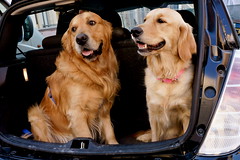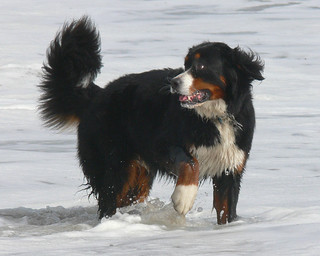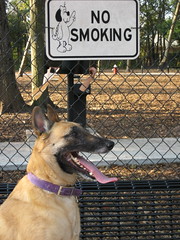How to prevent cancer in dogs and cats
 I often get the question, “how do I prevent cancer in my dog or cat?”
I often get the question, “how do I prevent cancer in my dog or cat?”
This is always a hard question to answer. There are so many factors involved in the development of cancer that even doing everything we can to avoid it, animals can still get cancer.
In addition cancer forms when multiple control processes in the body fail. There are many things we still do not understand about both why cancer forms and how to treat it effectively. I am certain that in the next fifty years we will understand a lot more and with the new gene and stem cell therapies that are emerging we will look back on how we work with cancer now as barbaric and ineffective.
Cancer is a breakdown of the immune system and the processing and chemical/hormonal systems in the body that regulate cell growth. Every day cancer cells form in our body and our immune system immediately finds them and destroys them. In addition there are chemical and hormonal processes in our body which stop cells from becoming cancerous. These processes make it so cells age and die naturally as new cells take their place. In cancer this does not happen. The signals for cells to age don’t work and cells rapidly divide and reproduce.
 We know that there are genetic factors involved in cancer. This is especially apparent in the purebred dogs. The Bernese Mountain dogs are the most likely breed to have cancer. I have never meet one who did not die of cancer, which is a shame for such a beautiful and kind dog. Most get cancer before their eighth birthday. They are closely followed in percentage of cancer cases by the Golden Retrievers and Boxers, who also are very prone to cancer.
We know that there are genetic factors involved in cancer. This is especially apparent in the purebred dogs. The Bernese Mountain dogs are the most likely breed to have cancer. I have never meet one who did not die of cancer, which is a shame for such a beautiful and kind dog. Most get cancer before their eighth birthday. They are closely followed in percentage of cancer cases by the Golden Retrievers and Boxers, who also are very prone to cancer.
Toxins and pollutants also have a role in cancer. BPA in plastics has been linked to cancer. Estrogens in our water supply may also contribute. We know there are industrial chemicals in the environment and pesticides and herbicides. These chemicals lead to cell damage and chemical abnormalities in the body, which can cause a failure of signals that stop cells from becoming cancerous or in a weakened immune system.
So with all these factors, what can we do to prevent cancer in your animal companions?
- In my opinion the number one thing you can do to help your animal friend is to feed the best diet possible. I prefer raw diets of high quality meat but a good home cooked or canned diet can also be great. If you feed canned food make sure the company which makes the food is not using BPA coated cans. If you can’t afford anything but dry feed a high quality dry food with high protein. Consider adding cancer fighting foods to their diet See Diets for Cancer – you are what you eat a fighting cancer machine.
- Avoid exposure to pesticides, herbicides and other toxins. Make sure you don’t use chemicals on your lawn, and when you are out walking your dog try to avoid the lawns that are too green and weed free. Be careful what chemicals you use in your home. Do not use harsh cleaning chemicals around your animal.
- Only use flea medications if needed unless your animal has a flea allergy. Yes these are also pesticides and the jury is still out on how toxic these products are to your animal friend. I feel like it is becoming too common to just put animals on year round flea treatment even when it is not needed. If you do use flea medications use the least toxic ones possible and avoid products with multiple ingredients.
- Avoid over vaccination. I do believe in vaccination but I believe the current vaccine schedules are more than is needed. There are studies confirming the links between vaccination and certain types of cancer like fibrosarcoma. While the correlation is harder to prove with other cancers there does seem to be association between over vaccination and certain cancers like hemangiosarcoma and leukemia. See To vaccinate or not to vaccinate that is the question part 1 cats and part 2 dogs.
- Keep your animal from becoming overweight and make sure they get exercise. Overweight animals are more prone to both cancer and inflammatory disorders such as asthma, inflammatory bowl disease, diabetes and Cushings disease. Exercise helps promote good blood flow and a healthy immune system.
- Do not smoke around your animal. There are studies that show that second hand smoke significantly increases the risk of cancer in your animal by three times the rate of animals in non-smoking households.
- Depending on the source of your water consider using a water filtration system. Some water contains toxins, hormones, and heavy metal contamination.
- If you have an animal at high risk of cancer because of breed or because of factors you can not control consider some extra anti-cancer tools
- Add supplements to their diet to help control cancer like Cod Liver Oil
, extra vitamin A and D, IP-6
, Coenzyme Q10
and/or mushroom supplements like MUSH Medicinal Mushroom Blend
or Host Defense MyCommunity
- Work with an acupuncturist or holistic vet to do treatments to help correct any imbalances early or to do occasional detox treatments. This can be done with acupuncture, herbs, homeopathics or other therapies.
- Get regular check ups to catch cancer early and when it is treatable.
- Add supplements to their diet to help control cancer like Cod Liver Oil
Is there more cancer in our animals then there used to be?
It is hard to tell. I believe a lot of cancer used to not get diagnosed. It was the ain’t doing right dog in the backyard that wasn’t taken to the vet, the cat who just wandered off one day.
 We definitely do a lot more diagnosing these days and with it catch more cancer then we used to. However I think our world has also become more toxic, with chemicals and pollutants. Our cats and dogs are down on the grass, sniffing, eating, licking their feet. Our animals are on our couches and beds that have flame retardant chemicals on them, they are eating foods that are becoming more unhealthy, they are being treated with more pesticides then every. So it is hard to say if there is really more cancer or that we are just doing more to diagnose and treat it then ever before.
We definitely do a lot more diagnosing these days and with it catch more cancer then we used to. However I think our world has also become more toxic, with chemicals and pollutants. Our cats and dogs are down on the grass, sniffing, eating, licking their feet. Our animals are on our couches and beds that have flame retardant chemicals on them, they are eating foods that are becoming more unhealthy, they are being treated with more pesticides then every. So it is hard to say if there is really more cancer or that we are just doing more to diagnose and treat it then ever before.
There is no way to completely avoid the risk of cancer but there are ways to decrease the risk. Many of these suggestions also can help avoid the risk of other chronic diseases and help animals have more energy and vitality as they age.
Return to Integrative and Holistic Methods for Treating Cancer in Cats and Dogs

